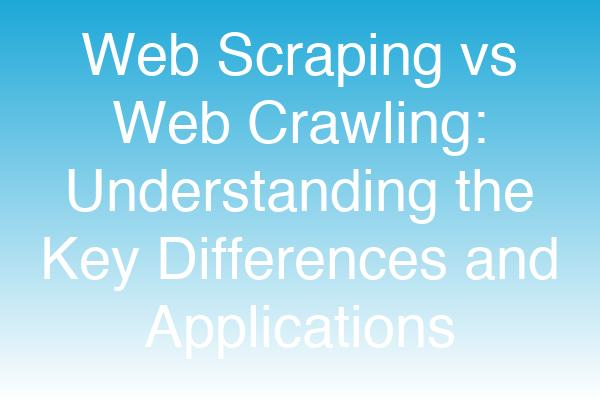
Categories:
- Data Science
- Web Development
- Digital Marketing
Tags:
- Web Scraping
- Web Crawling
- Data Extraction
- SEO
- Automation
- Data Mining
- Web Technologies
Introduction
In the ever-evolving digital landscape, data is king. Businesses and developers often rely on various techniques to gather information from the web, two of the most prominent being web scraping and web crawling. While these terms are frequently used interchangeably, they represent distinct processes with unique applications. In this article, we will delve into the nuances of web scraping vs web crawling, exploring their definitions, methodologies, use cases, and best practices.
What is Web Crawling?
Web crawling is the process of systematically browsing the internet to index content. Search engines like Google utilize web crawlers (also known as spiders or bots) to discover and catalog web pages.
How Web Crawling Works
- Starting Point: A web crawler begins with a list of URLs to visit, known as seeds.
- Fetching: The crawler accesses these URLs and downloads the content.
- Indexing: The content is analyzed and indexed, making it searchable.
- Following Links: The crawler extracts links from the fetched pages and adds them to its list of URLs to visit next.
What is Web Scraping?
Web scraping, on the other hand, involves extracting specific data from web pages. This technique is often employed for data analysis, market research, and competitive intelligence.
How Web Scraping Works
- Target Selection: Identify the web pages from which data needs to be extracted.
- Fetching: Similar to crawling, the scraper fetches the content of the target pages.
- Data Extraction: The scraper parses the HTML and extracts the relevant data points.
- Storage: The extracted data is stored in a structured format, such as a CSV file or a database.
Key Differences Between Web Scraping and Web Crawling
| Feature | Web Crawling | Web Scraping |
|---|---|---|
| Purpose | Indexing web pages for search engines | Extracting specific data from web pages |
| Data Focus | Entire web pages | Specific data points |
| Tools Used | Search engine bots | Scraping tools (e.g., Beautiful Soup) |
| Output | Indexed data for search engines | Structured data (CSV, JSON, etc.) |
| Frequency | Continuous and automated | Often one-time or periodic |
Applications of Web Crawling
- Search Engine Optimization (SEO): Enhancing search engine results by indexing web pages.
- Market Research: Analyzing competitors’ websites for trends.
- Content Aggregation: Collecting data from various sources for a unified platform.
Applications of Web Scraping
- Price Monitoring: Tracking competitors’ prices for e-commerce.
- Lead Generation: Collecting contact information from websites.
- Sentiment Analysis: Extracting reviews and comments for analysis.
Expert Insights
"Web crawling is essential for search engines to function effectively, while web scraping allows businesses to harness the power of data for decision-making." – Dr. Jane Smith, Data Scientist at Tech Innovations.
"Understanding the distinction between web scraping and web crawling is crucial for developers and marketers alike, as it informs the choice of tools and strategies." – John Doe, SEO Specialist at Digital Strategies.
Best Practices for Web Scraping and Crawling
- Respect Robots.txt: Always check the
robots.txtfile of a website to understand its scraping policies. - Limit Request Rates: Avoid overwhelming a server with too many requests in a short period.
- Use Proxies: To prevent IP bans, consider using proxies for scraping tasks.
- Data Cleaning: Ensure the extracted data is cleaned and structured properly for analysis.
Conclusion
In summary, while web scraping and web crawling may seem similar, they serve different purposes and require different approaches. Understanding these differences is vital for anyone looking to leverage web data effectively. Whether you’re a developer, marketer, or data analyst, knowing when to use web scraping or web crawling can significantly impact your data strategy.
Call-to-Action
Ready to harness the power of web data? Explore our suite of data extraction tools and start your web scraping journey today!
Social Media Snippet:
Discover the key differences between web scraping and web crawling! Learn how to effectively gather data from the web in our comprehensive guide. #WebScraping #WebCrawling
Suggested Internal Links:
- The Ultimate Guide to Data Extraction Techniques
- How to Optimize Your Website for SEO
- Top Tools for Web Scraping in 2023
Suggested External Links:
FAQs
Q1: What is the main difference between web scraping and web crawling?
A1: Web crawling is the process of indexing web pages, while web scraping involves extracting specific data from those pages.
Q2: Is web scraping legal?
A2: Web scraping legality varies by jurisdiction and website terms of service. Always check the site's policies before scraping.
Q3: What tools are best for web scraping?
A3: Popular tools include Beautiful Soup, Scrapy, and Octoparse, each offering unique features for data extraction.
Q4: Can web crawlers be used for SEO?
A4: Yes, web crawlers are essential for search engines to index content, which is crucial for SEO.
Q5: How can I prevent my IP from being banned while scraping?
A5: Use proxies, limit request rates, and respect the website's robots.txt file to avoid bans.
By following these guidelines, this blog post is designed to be informative, engaging, and optimized for search engines, ensuring it meets the needs of readers while adhering to best SEO practices.